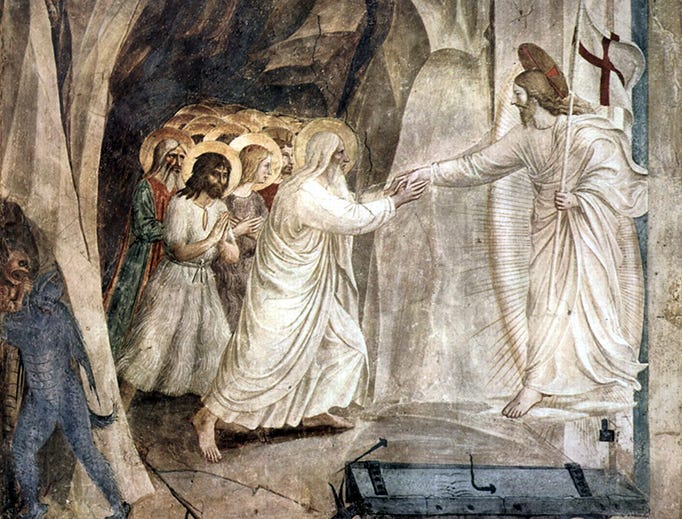"He Descended into Hell": The Theology of Holy Saturday
What St. Augustine, St. Thomas, the Council of Trent, and Hans Urs von Balthasar believe
Our Lord, in view of His Incarnation, His radical being-with man, comes to free us from the clutches of death itself. In so doing, He must experience the full weight of human suffering and sin and the consequences of sin—without Himself succumbing to sin and concupiscence.
An integral part of the human condition is death. Christ therefore, to inaugurate man’s salvation, must experience all that man experiences so that, even at the very limits of God-forsakenness, even at the furthest limits of self-imposed rejection of Divine love, even there, God Himself has been, and, in a real sense, reaches man in those most remote places.
Amidst the agony of Good Friday and the joy of Easter, rests a deafening silence—Holy Saturday. This integral day of the Holy Triduum is necessary for the working of salvation.
“Nietzsche is right for just one day and God was dead. The Word has ceased to sound in the world, the body is buried and sealed, and the soul descends into the abyss of Sheol.”1 God really died. He really descended into hell.
What happened while He was there? Where exactly did He go? Who exactly did He free? These are all questions posed to us on this silent day. Unfortunately, Scripture is rather silent on the details of this event. In any case, the events of this day are mostly left to theological speculation, with only a few details confirmed by Scripture.
In this essay, I will present a historical sketch of the theology of the descent into hell in the hopes that you can grasp a fuller sense of the theological speculations surrounding this most silent of days.
This essay is mainly derived from a research essay I wrote while in seminary. It has been modified for readability and ease of access for this post.
“He Descended Into Hell”
Christ’s Passion, Death, and Resurrection are the pinnacle of the Church’s celebrations. Within these days are great depths and mysteries which the human mind cannot fully grasp until we are on the other side of eternity. After the Crucifixion, in light of the Resurrection to come, there is an often overlooked day—Holy Saturday.
The Apostle’s Creed affirms that after the Crucifixion, Christ “descended into hell.” On this day, Christ is silent.2 Throughout the history of the Church, including into modern times, there have been sparse writings as to the nature of Christ’s descent. In this paper I will give a brief historical sketch through the tradition so as to help you better grasp this most silent of days.
In Sacred Scripture
Throughout the New Testament, the descent is rarely mentioned. The most prominent place is in the first letter of St. Peter. Peter begins by announcing the mission of Christ’s Passion: “Christ also died for sins once for all… that he might bring us to God, being put to death in the flesh but made alive in the spirit” (1 Pet 3:18)3. Peter then continues and writes that Christ “went and preached to the spirits in prison” (1 Pet 3:19). Much of the Church’s theology of Holy Saturday is centered around these passages because they offer the most clarity, while still being ambiguous. As I will show, the exact details of this mystery are more difficult to ascertain based on the short account that Scripture gives to this event.
If you would like to read the rest of the essay, including what the ancient homily, St. Augustine, St. Thomas Aquinas, the Roman Catechism, Hans Urs von Balthasar, and the Catechism say about the descent into hell, upgrade to a full subscription now.
However…
To celebrate the Triduum and to give you access to this important theology, I’m offering 🔓 20% off a full year of paid access to In Defense of Theology!
An Ancient Homily (Early Church)
Keep reading with a 7-day free trial
Subscribe to In Defense of Theology to keep reading this post and get 7 days of free access to the full post archives.





